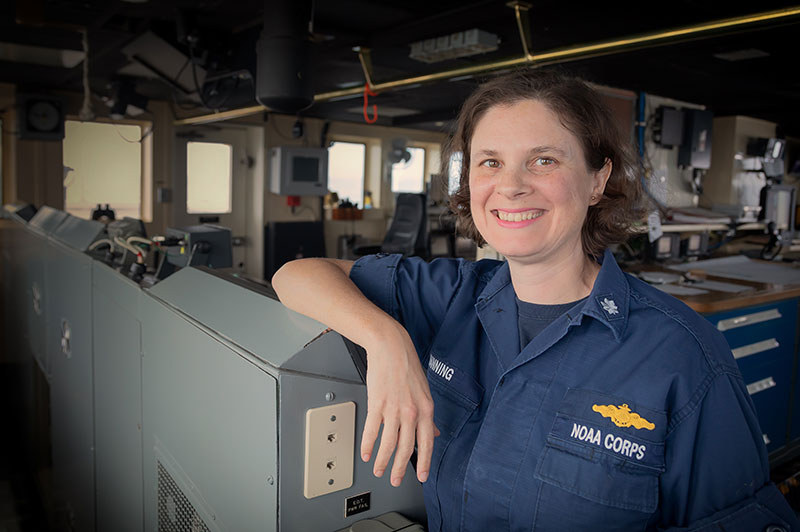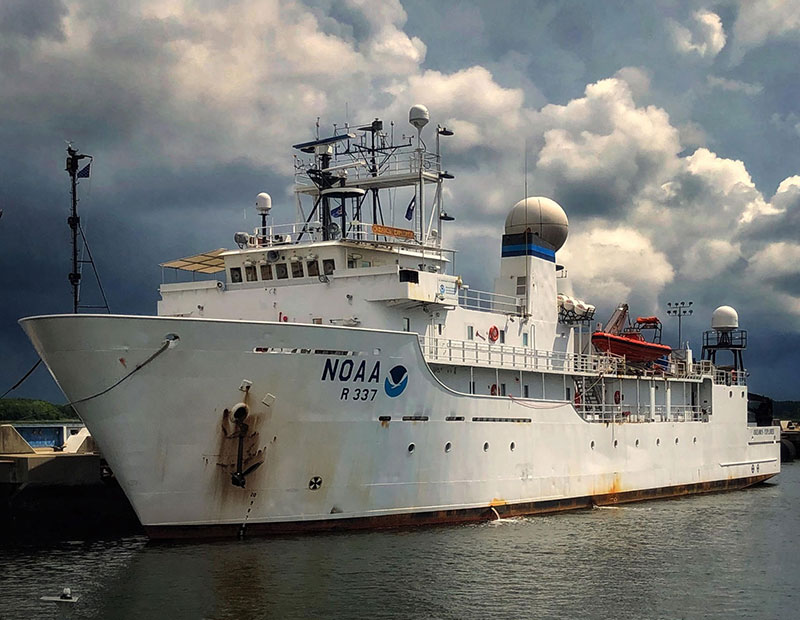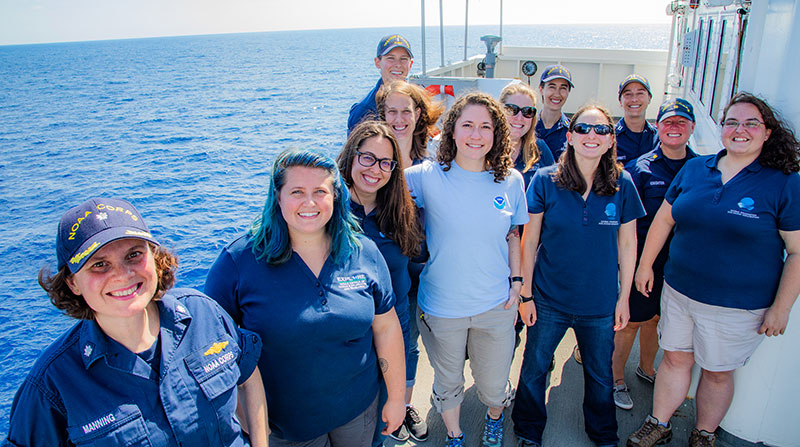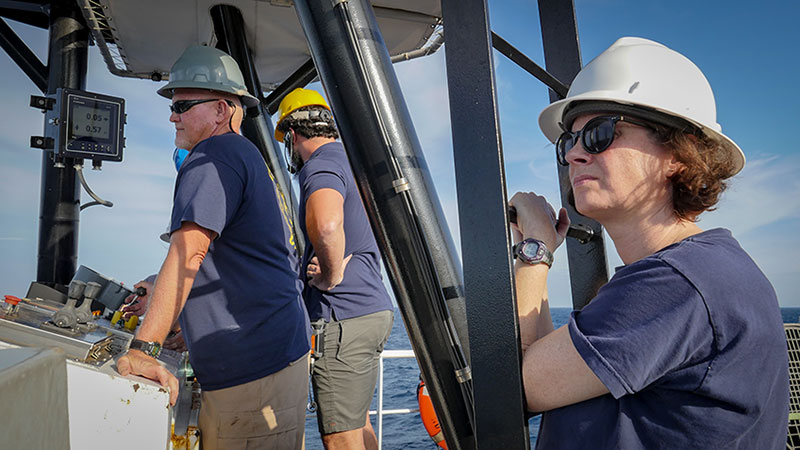
by Rachel Gulbraa, NOAA Office of Ocean Exploration and Research
July 11, 2019

Commander Nicole Manning, the sixth Commanding Officer of NOAA Ship Okeanos Explorer. Image courtesy of the NOAA Office of Ocean Exploration and Research, Windows to the Deep 2019. Download larger version (jpg, 2.9 MB).
On Sunday, June 16, 2019, before the start of her 100th ocean exploration mission, NOAA Ship Okeanos Explorer could be found in port, rather than exploring the deep sea. The occasion? A formal maritime change of command ceremony, and the official welcoming of Commander (CDR) Nicole Manning as the sixth Commanding Officer (CO) of the Okeanos Explorer. A NOAA Corps Officer, CDR Manning will be in command of the ship for the next two years. She was able to take a short break from her duties to answer some questions and share a little bit about her experiences and her role.
Interviewer: For our readers who don’t know, can you explain a little about the NOAA Corps, as well as what it means to be a CO?
CO Manning: The NOAA Commissioned Officer Corps (NOAA Corps) is one of the nation’s seven uniformed services. Officers directly support nearly all of NOAA’s many programs and missions, with over 300 NOAA Corps officers serving throughout the agency. The Corps can be traced back to the former National Geodetic Survey, which was established by President Thomas Jefferson in 1807 to survey and map the U.S. coastline.
The CO stands for commanding officer. This is a role that is given to the most senior officer on board the ship. The CO is ultimately responsible for the safety and efficiency of everyone under her command, including the scientists. While a commanding officer has the right to delegate responsibility, she still retains the ultimate responsibility for the safe navigation of the vessel. This entails understanding how to interpret marine weather; making sure the ship is stable; ensuring that all the equipment works properly; and having the knowledge, skills, and ability to handle the ship in many different kinds of sea states and weather conditions.

NOAA Ship Okeanos Explorer is the only U.S. federal vessel dedicated to exploring our largely unknown ocean for the purpose of discovery and the advancement of knowledge. Image courtesy of the NOAA Office of Ocean Exploration and Research, Windows to the Deep 2019. Download larger version (jpg, 797 KB).
Tell us a little about your experience so far – what is the significance of the change of command ceremony, and what were your first few days on the current expedition like?
A change of command is the formal passing of responsibility, authority, and accountability from one officer to another. The ceremony is a time-honored tradition for as long as ships have gone to sea. It is also the opportunity for the outgoing Commanding Officer to personally thank and say goodbye to all members of his or her command.
I am currently sailing on my first project on NOAA Ship Okeanos Explorer as CO, and so far it has been very exciting. We are doing a dive every day, and between the expedition team leads and crew, I am being trained up very well.

CDR Manning (far left) on the deck of the Okeanos Explorer with some members of her crew. Image courtesy of the NOAA Office of Ocean Exploration and Research, Windows to the Deep 2019. Download larger version (jpg, 4.9 MB).
How did you end up on this career trajectory? Where did you start off, and how did it lead you to where you are today?
I started off as a molecular biologist working for the National Institutes of Health and various biotech startup companies before accepting a commission in the NOAA Corps. I was not sure what professional route I wanted to take in the sciences (whether to go the academic route or work in a lab). NOAA Corps offered an opportunity where I could learn new skills (like driving ships) and explore other avenues in the sciences. I figured I would do two to five years and then pursue a graduate degree in biology. And here I am, 17 years later. The great thing about a career in the services is that you must change assignments every two to three years. You are constantly changing jobs. This keeps you on your toes and just outside your comfort zone. But you are also continually pushing yourself and growing. I find the work very exciting and challenging.
How does this post differ from others that you’ve held? What do you expect will be the most exciting aspect of this role? The most challenging?
During my last two sea-going assignments, the research conducted on the vessel focused on physical oceanography and climate variability. Most of the research, although very exciting, was a bit more abstract. In contrast, NOAA Ship Okeanos Explorer focuses more on basic exploration and discovery through real-time videography of never before examined deep-water topography. I expect that the most exciting aspect is the anticipation of seeing something that no one has ever laid eyes on before – albeit through the lenses of very powerful cameras. It feels like the day before Christmas every day. Not only that, but we get to share those discoveries in real time with the viewing public.

CDR Manning observing operations. Image courtesy of the NOAA Office of Ocean Exploration and Research, Windows to the Deep 2019. Download larger version (jpg, 2.8 MB).
Had you spent much time at sea before joining the Corps?
I was a high school student volunteer for the Waikiki Aquarium in Honolulu. We would hop from island to island on a small research vessel called the R/V Kila, so I had some experience on the water. I never imagined I would be in command of a research ship and loving it. You just never know what path your career will take when you pursue a science focus. My experience has so far has been amazing.
However rare or unlikely, what’s the one thing you’d most like to see at sea?
I think it would be super neat to discover a shipwreck or dive on a thermal vent. I’ve seen a lot of unusual things at sea and there are just some things that never get old, like a perfect sunset or sunrise over the water.
Do you have any advice for young people who may want to follow in your footsteps?
Sure! Don’t ever be afraid of math and science classes. I hated science when I was in elementary school because I thought I wasn’t good at it. The truth is you don’t have to possess superhuman powers to be a good student in any subject. You just have to have confidence and passion and the rest will fall into place. If you are already on that path, then hopefully you will see that there are many unique career paths for science students. Some are less advertised than others (such as NOAA Corps), and may sling-shot you into less traditional trajectories. Embrace those opportunities even if they were not what you initially envisioned.
Is there anything else you’d like to share?
I am very proud of every day that I get to work alongside some of the most skilled and knowledgeable folks around – people who genuinely love what they do, and freely share that passion and expertise with the public. Hopefully, you see that too, and feel inspired.